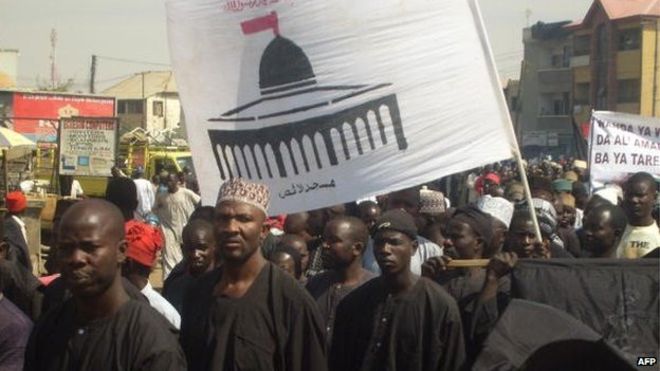
By Garba Muhammad
KADUNA, Nigeria (Reuters) – A Nigerian minority Shi’ite Muslim sect that has been declared an unlawful society by a northern state vowed on Saturday to challenge the ban.
The Islamic Movement in Nigeria came to prominence when its members clashed with the army in the northern city of Zaria, Kaduna state, in December 2015. A judicial inquiry in August concluded that the army killed 348 of the sect’s members.
The Kaduna state government on Friday said anyone convicted of being a member of the sect could be imprisoned for seven years, fined or both. The size of the fine was not specified.
Diplomats and security analysts say the violence risked spawning a radical Shi’ite militant wing, just as the Boko Haram uprising began in 2009 after security forces killed hundreds of its members and its leader Mohammed Yusuf died in custody.
The Shi’ite sect’s leader, Sheikh Ibrahim Zakzaky, has been held in custody, without charge, by Nigeria’s security agency since his December arrest following the clashes. His supporters have called for his release.
The Kaduna state government said the group had “overtly continued with unlawful processions” and “obstruction of public highways” since the clashes.
“These acts, if allowed to go unchecked will constitute danger to the peace, tranquillity, harmonious coexistence and good governance of Kaduna state,” it said, declaring the group unlawful with immediate effect.
A spokesman for the sect, Ibraheem Musa, said its members were not going to be intimidated into resorting to violence.
“Very soon, we shall challenge this ban through legal and peaceful means,” he said.
Members of the sect are among the several thousand Shi’ite Muslims whose movement was inspired by the 1979 Islamic Revolution in Iran.
The majority of the tens of millions of Muslims in Africa’s most populous nation of 180 million inhabitants are Sunni – including the Boko Haram militants who have killed thousands mainly in the northeast since 2009.
(Additional reporting by Alexis Akwagyiram, Camillus Eboh and Felix Onuah; Writing by Alexis Akwagyiram; Editing by Leslie Adler and Stephen Powell)